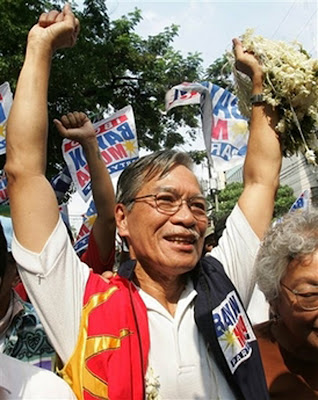From journalist to social activist, peace and human rights advocate and now three-term congressman, Rep. Saturnino "Satur" Cunanan Ocampo has truly earned his place as one of the most known and respected leaders of the opposition and the progressive people's movement in the country.

Born to a family of landless tenant farmers on April 7, 1939 in Sta. Rita, Pampanga, Satur's life has always been tied to the ordinary people's struggle for justice and equal opportunity. His experience as a working student and campus journalist led him to become a founding activist of the Kabataang Makabayan in 1964. In 1967, he was elected to the National Council of the Movement for the Advancement of Nationalism (MAN) headed by the late Sen. Lorenzo M. Tanada.

Satur worked as a business editor at the Manila Times and was elected vice president of the National Press Club from 1970-1972. Upon the declaration of the Martial Law, he fought the Marcos dictatorship, joined the revolutionary underground and helped found the National Democratic Front (NDF) in 1973. In 1976, he was arrested, severely tortured and detained for nine years - one of the longest - held detainee under martial law. In prison, he led hunger strikes and other protests against torture and other human rights abuses, gaining meaningful victories for fellow deatineed. In dramatic fashion, he escaped from captivity in 1985 and rejoined the underground movement.

With the dictatorship's ouster in 1986, Satur resurfaced as head of the NDF negotiating panel in peace talks with the Aquino government. The talks were short-lived and eventually broke down due to the infamous Mendiola massacre on January 22, 1987. In 1989, Satur was rearrested with his wife Carolina "Bobbie" Malay, charged and tried with various crimes of which he was eventually acquitted. He regained freedom in 1992.
Over the next 10 years, Satur worked with various people's organizations and human rights groups. He also went back to his old love of writing. He wrote columns and commentaries through the Philippine News and Features (PNF) and several newspapers.
In 2001, Satur led the Bayan Muna party in topping the party list elections with an unprecedented 11.7% of all votes cast. Thus began his career as a lawmaker for the marginalized and underrepresented sectors. The Bayan Muna victory opened up a new arena to advance the struggle for change and equal opportunity for all.

As a member of the House Majority from 2001-2005 and the Minority since 2005, Satur and his fellow progressive legislators have effectively used Congress as a forum to ventilate the people's issues, pursue their well-being and oppose measures that infringe on their rights. THeir role as a genuine opposition has often put them at odds with the powers that be that in 2006, the Arroyo government attempted to arrest six of them on trumped up rebellion charges. The case was ordered dismissed by the Supreme Court in 2007.

As head of the progressive party-list bloc and Deputy Minority Leader in the 13th and 14th Congresses, Satur has spearheaded the fight for truth, justice, human rights and good governance in the face of the Arroyo administration's abuses. He initiated the formation of the House Committee on Peace, Unity and Reconciliation which he initially headed. He also served as vice-chairperson of the Human Rights Committee. He continues to author bills and resolutions supporting human rights, peace, health, education, good governance, senior citizens, indigenous peoples and OFWs.
Satur has authored or co-authored several bills that were passed into law such as the Anti-torture Law (RA 9745), Tax Relief for Minimum Wage Earners Act of 2008 (RA 9504), Strengthening of Public Attorney's Office Act of 2006 (RA 9406), Abolition of the Death Penalty (RA 9346), Anti-Violence Against Women and Children Act of 2004 (RA 9262), Anti-Trafficking in Persons Act of 2003 (RA 9208), and Overseas Absentee Voting Act of 2003 (RA 9189).

In May 2009, he was elected president of Makabayan, a coalition of progressive political parties and has been chosen to be one of its senatoriable candidates in the 2010 elections. He has also been president of Bayan Muna since 1999.
In face of repeated State prosecution spanning decades, Satur has stood steadfast in his beliefs, principles and commitment to serve the people selflessly. His calm demeanor and diplomatic candor couch the fire in his heart that continues to rage for the people he serves. It is perhaps this enviable qualities that has earned Satur the respect of a broad array of friends and allies, his fellow lawmakers, government officials, and even critics. More importantly, Satur occupies the lofty spot in the people's admiration as someone they can truly claim as their own lawmaker and statesman.
Satur C. Ocampo aims to be the voice of equal opportunity in the Senate. He is committed to working for the upliftment of the poor and marginalized in Philippine society: the farmers, workers, fisherfolk, urban poor, indigenous peoples, women, youth, employees and Filipino entrepreneurs.
He vows to bring back to the Senate the nationalist legacy of former Senators Claro M. Recto, Jose W. Diokno and Lorenzo M. Tanada.
Satur also hopes to pursue in the Senate his long-time advocacy for peace and human rights.
1. Uplift the poor and marginalized
Work for the upliftment of the economic conditions and dignity of the truly poor and marginalized:
- ensure the workers' right to a secure job and a living wage, including a stop to unjust labor contracting schemes;
- put a stop to unbridled demolitions of the homes and livelihoods of the poor;
- enact a universal health care policy that would provide free hospitalization to children and the elderly, reverse the devolution of health services, bring down prices of medicines, and expand coverage of PhilHealth;
- expand free legal services for poor litigants;
- guarantee tertiary education for poor students through a comprehensive scholarship and study now pay later policy;
- empower the poor and marginalized by respecting their rights and providing greater representation and participation in Congress, local government units and other government agencies.
Pursue a nationalist economic policy and a government that is truly accountable to the people and serves the national interest above all:
- develop the countryside through genuine agrarian reform, effective support and subsidies to farmers and the adoption of modern and sustainable farming technologies;
- protect, support and subsidize Filipino industries as well as review and correct unfair and anti-Filipino trade policies (e.g. liberalization, deregulation and privatization);
- ensure the development of a self-reliant and competitive domestic economy;
- repeal the automatic appropriations policy on debt and rechannel the debt service budget to social services and national development
- hold Mrs. Arroyo and her officials accountable for their acts of plunder, electoral fraud, human rights violations and other crimes even as policies are to be put in place ensuring greater transparency and accountability in government;
- pursue an independent foreign policy by, among others, abrogating the RP-US Visiting Forces Agreement, the Mutual Defense Treaty and other one-sided agreements with other countries and foreign entities.
Pursue a peace policy that seeks to resolve the roots of the armed conflict:
- address the roots of the armed conflict through the resumption of the peace talks and/or implementation of previous agreements with the NDF, MILF and MNLF;
- implement the UN Special Rapporteur's recommendations on the extrajudicial killings, enforced disappearances and other human rights atrocities;
- compensate the martial law human rights victims and indemnify all other human rights victims;
- free all political prisoners.









No comments:
Post a Comment